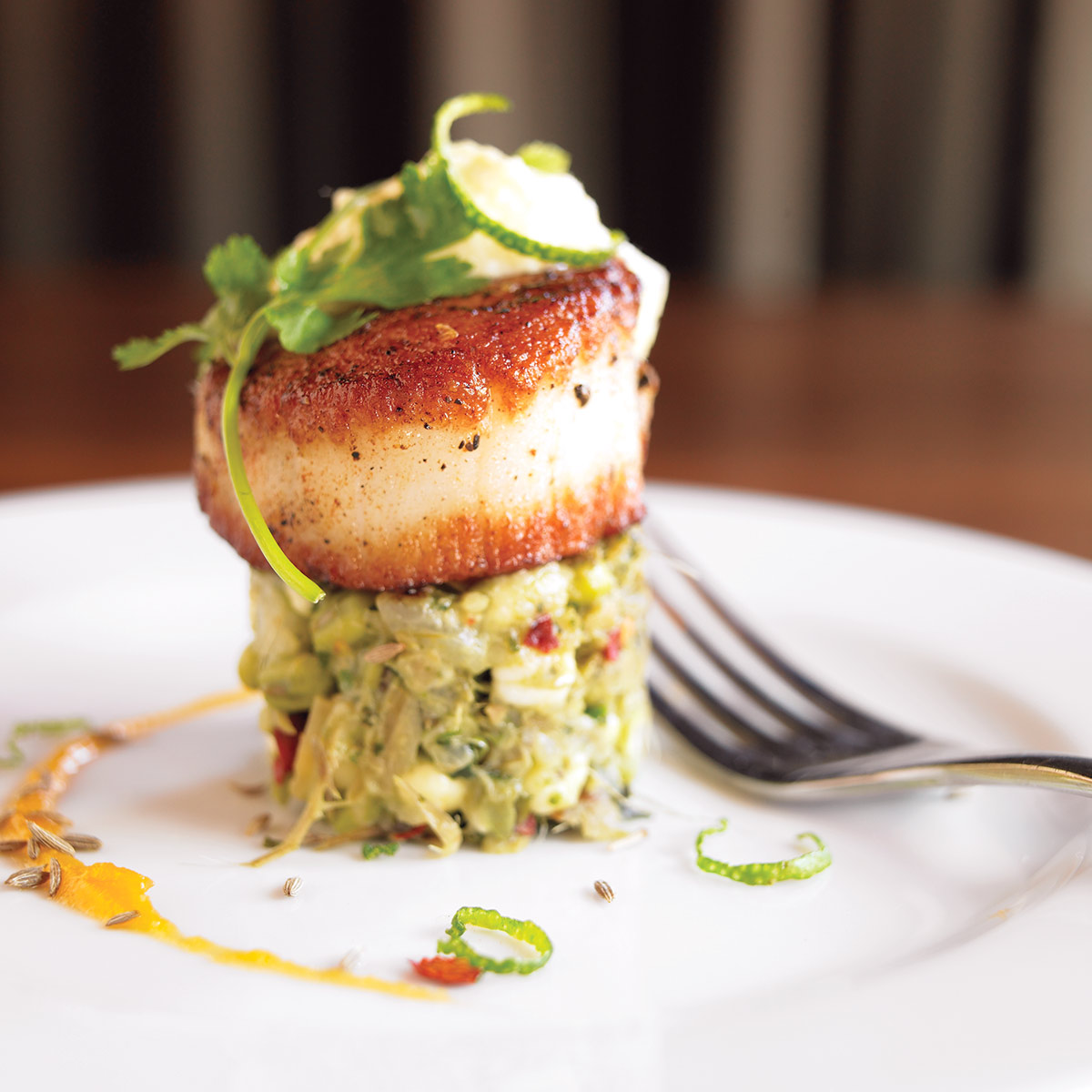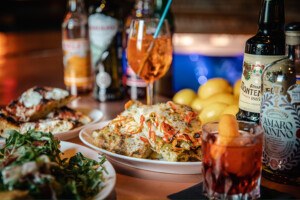A Mishmashing Success

Photo by Keller + Keller
Another meteor has fallen to earth, this time in the South End. Seven years after Mantra hit the Ladder District like a UFO, maybe we shouldn’t be surprised by Banq: It’s equally otherworldly, with a wild and strangely beautiful, if slightly disorienting, design, in a once grand bank in a once shabby part of town; a loud, hip crowd; and oddly satisfying, if slightly disorienting, food.
But now, rather than Indian-French—which was unknown to Boston when Mantra opened—owner Hemant Chowdhry, along with co-owner Mark Raab, has chosen Indian-French-Indonesian-Thai. Ingredients are borrowed from Indian and Indonesian cuisines, techniques from both small villages and grand French kitchens. This makes for food less sumptuous than Mantra’s was (today it’s more a nightclub than a restaurant, its culinary ambition now a memory), yet still carefully and artfully presented—and sometimes more interesting. When the inventions succeed, they’re hits of a kind that seems altogether new, not just new to Boston.
I haven’t eaten around India, but the Banq chef, Ranveer Brar, told me that in the posh but conservative New Delhi kitchens where he once worked, creations like his would be unfamiliar and unwelcome. After cooking professionally in Singapore and Thailand, he wanted to spread his wings in America; a chance meeting with Chowdhry and Raab at a world pastry competition in Phoenix gave him his ticket.
We should be glad his first American stop is Boston. It might be generally as conservative as New Delhi, but if any neighborhood will support adventurous cooking, it’s the South End—especially when the food is served in a room this stylish. You’ve probably already seen pictures of Banq’s ceiling, with its white birch waves that undulate above and around diners like something Gaudí would have put in an underground chapel. It’s at once intimate, restful, and exciting (though not great at muffling noise). The building’s origins as a bank are practically invisible inside, though the Beaux Arts façade has been polished to a newly snooty gleam.
It’s not the sort of exterior that would make you expect the dish that got my attention: the tea-smoked quail and date “cigar” ($12), which looks like a thin spring roll. Instead of vegetables, the filling is shredded quail, colored tobacco-brown with finely chopped dates and flavored with blood orange rind and fresh mint. Brar told me he smokes the meat using tea leaves, maple wood, and actual cigars; the sweetness of the dates and the light smoking make the quail taste like cigar-smoked ham—in a good way. The dish is terrific, and the almond-tamarind shot served on the side is a nicely smooth-textured, sweet-sour complement.
No other appetizer I tried was such a knockout, but the relatively tame “Asian amuse” of coho salmon cubes grilled on a sugarcane stick in a cherry tomato vinaigrette ($4.50) was satisfying and just unusual enough to be interesting. Kaffir lime leaves add the seductively sweet citrus flavors that always draw me to Thai food, and the warm vinaigrette, half oil and half butter, lends a French sheen. Steamed mussels ($9), flavored with another Thai-French blend of lemongrass, white wine, and “holy basil” (the clove-scented Indian herb), are a refreshing take on a typically routine dish.
What might have been the most labor-intensive appetizer went several influences too far: mung bean crêpes stuffed with a wild mushroom ragoût on Asian fruit tartare with grilled chèvre and arugula ($11). This could be a case of needing to know and like Indian textures. I found the crêpes, made of a purée of fresh mung beans, unpleasantly mushy (a sensation not alleviated by the shallot-and-cilantro-flavored yogurt sauce). And the rest of the flavors—none of them distinct or, for that matter, compensatingly crunchy—seemed a confusing mishmash. By contrast, two perfectly seared scallops on a bed of mung bean purée ($5.50), freshened with cilantro and chopped lime leaves, show just how good the chef’s experiments with what the menu cryptically calls a “cosmopolitan palate” can be.
The entrées are less complicated if no less cosmopolitan. First-timers should go for the fire-charred sirloin ($26), excellent and straightforward meat whose exotic counterparts come across as standard steak sides. Sliced taro root baked with cream and white wine and flavored with caraway seed forms a comforting cake akin to a potato gratin, and broccolini cold-smoked over maple with a honey-mirin sauce is a green veg with enough punch to stand up to the steak, yet not so much as to deter steakhouse regulars.
My favorite entrée struck me as forcefully as the quail-date cigar, but it’s a tough sell: zucchini and tofu “steak” ($19). Right, you’re put off already, and the steak does look like some suspect patty that could be gross health food. But it’s not gross, and it doesn’t taste like health food. The zucchini is roasted and then mixed with tofu, subtly spiced with toasted cumin and coriander, pounded till firm but not rubbery, and stuffed with homemade sun-dried tomatoes strongly flavored with Thai basil. You won’t know there’s a shred of tofu in it. A lightly acidic yellow tomato coulis complements the “meat,” let’s call it, and a bed of mushroomy noodles in a cream and garlic sauce has the mouth-filling weight of peanut sauce. The whole thing is so satisfying it won over two tofu haters at my table.
The unconvinced have a few fish options. The best is the char-grilled haddock ($24) with a crisp top, served over bok choy and accompanied by a nicely crunchy water chestnut ragoût and an extraneous sauce of olive-tomato butter. There’s poultry, too, but based on the three dishes I tried, it’s better avoided. A chicken special was cardboard, though with an interesting soft lotus seed cake and a semi-spicy black yam purée ($21); pan-seared Muscovy duck breast ($25) seemed dry and overdone because it was coated with a grainy cinnamon glaze; the Cornish hen ($22) was also too dry, and the best part of the plate was a nest of chili-lime fingerlings.
Desserts are more expertly made, if unremarkable, like the crowd-pleasing hazelnut and chocolate parfait with a mild kirsch anglaise ($9). I liked the selection of crèmes brûlées ($9), served in dainty cups, with long, homemade pistachio cookies with the crackle of the French biscuits called langues de chat (cat’s tongues).
Sure, Banq is uneven, and the sometimes overcomplicated menu and less-sure touch mean it’s not the fully formed phenomenon Mantra was the night it landed. But with prices this reasonable and surroundings this exciting, complaints are carping. Go and be allured.


